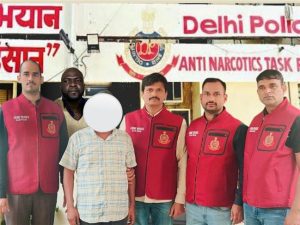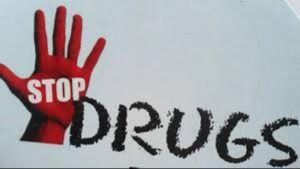New Delhi – In a major breakthrough for Indian law enforcement, a massive international drug syndicate was dismantled in a high-stakes operation led by the Delhi Police Crime Branch. The crackdown resulted in the arrest of seven individuals, including three foreign nationals, and the seizure of high-grade drugs valued at approximately ₹8.75 crore on the international market.
This strategic operation is being hailed as one of the most significant blows to narcotics networks operating between Nepal and northern India.
Unraveling the International Drug Syndicate
The international drug syndicate had established a multi-layered network across borders, especially targeting the high-demand drug corridors in Delhi, Punjab, Haryana, and Rajasthan. The syndicate’s operations were linked to suppliers in Nepal and Himachal Pradesh, from where narcotics were routed to Indian states using covert channels.
What makes this drug bust monumental is the intricate design of the network and its seamless ability to operate across international borders. The arrested individuals were key operatives, acting as couriers, suppliers, and mid-level distributors of the illegal charas supply.
Key Arrests: The Faces Behind the Network

In total, seven people were arrested during the month-long investigation. These include:
-
Mohammad Jamal – A resident of Nihal Vihar, Delhi, and suspected of managing distribution in the capital.
-
Prem Thapa – A Nepalese national with a history of cross-border operations.
-
Ganga Gurung Thapa – Another Nepalese national and a crucial link between Nepalese suppliers and Indian traffickers.
-
Ankit Budha – A resident of Kasol, Himachal Pradesh, and reportedly the main supplier of charas.
-
Pradeep Kumar – A local of Ballabhgarh, Haryana, who managed state-level movement.
-
Manjeet – From Mohali, Punjab, known to be a major receiver and redistributor.
-
Moti Lal – Resident of Jaipur, Rajasthan, with alleged ties to buyers in Rajasthan’s elite circles.
These individuals worked collectively to facilitate the transfer, concealment, and sale of high-quality charas across multiple states.
How the Operation Began?


The takedown of the international drug syndicate started on a tipoff received by the Delhi Police in November 2024. Intelligence inputs hinted that a foreign national was to deliver narcotics in the Majnu Ka Tila area of Delhi. A special team was deployed and closely monitored the area.
Soon, police intercepted Prem Thapa and Mohammad Jamal during a hotel handoff. A search of their belongings led to the recovery of over 1 kilogram of charas. Upon interrogation, both suspects revealed links to a much larger supply chain operating out of Himachal Pradesh and Nepal.
Uncovering the Stockpile
Following the leads from Thapa and Jamal, the Crime Branch tracked and apprehended Ganga Gurung Thapa from Wazirabad, Delhi. A small quantity of charas was recovered from him during the arrest. However, what stunned officials was the follow-up search of his residence—where a massive 13.766 kilograms of high-grade charas was discovered.
The investigation revealed that Ganga was a middleman receiving charas from Kasol, which was then repackaged and sent to distributors across Delhi and nearby states.
A Trail to Himachal Pradesh
The syndicate’s deep connections to Himachal Pradesh became clearer with the arrest of Ankit Budha, who operated out of Kasol, a hotspot known both for its natural beauty and underground drug economy.
Ankit was allegedly the primary supplier and had been sending consignments using private vehicles and concealment methods such as food containers, courier parcels, and specially crafted suitcases.
Officials say this marked the most dangerous layer of the international drug syndicate, as Budha’s operation allowed for bulk smuggling while avoiding detection.
Also Read: Waqf Amendment Bill 2025: Bold Amendments That Sparked Controversy
Multi-State Distribution Network


The remaining four accused — Pradeep Kumar (Haryana), Manjeet (Punjab), and Moti Lal (Rajasthan) — played vital roles in distributing the narcotics in their respective states.
Each of them had developed independent client networks, many of whom were high-profile users in nightlife circuits and affluent circles. The charas was sold in smaller packets, fetching high profits and ensuring a steady flow of cash into the syndicate.
The keyphrase international drug syndicate was uncovered at each level of this carefully architected network.
Value of the Seizure
The total value of charas seized from the gang exceeded 17 kilograms, a haul considered significant in commercial quantity under the Narcotic Drugs and Psychotropic Substances (NDPS) Act.
In the international market, the estimated value of this seizure stood at ₹8.75 crore, showcasing the scale of financial resources being circulated within the international drug syndicate.
Officials also confirmed that had the distribution reached its intended markets, the total street value might have exceeded ₹10 crore when broken into smaller quantities.
Legal Charges and Proceedings
All seven accused have been booked under various provisions of the NDPS Act, especially those dealing with commercial quantity possession, cross-border trafficking, and organized crime. If convicted, they may face rigorous imprisonment ranging from 10 to 20 years, along with hefty fines.
Authorities are also exploring the possibility of invoking anti-terror financing clauses if connections to money laundering or extremist networks are found.
Court proceedings are expected to begin soon, and the police have filed for extended custody to interrogate and uncover further players in the international drug syndicate.
Crime Branch’s Role and Commendation
The role of the Crime Branch has been applauded, with senior officials confirming that the bust was the result of weeks of surveillance, undercover operations, and strategic coordination between intelligence units.
This successful dismantling of the international drug syndicate also opens the door for future raids based on digital records, phone logs, and location data retrieved from the accused.
Sources close to the investigation mention that foreign agencies may be looped in for deeper scrutiny of international routes.
Societal and National Impacts
Beyond the legal implications, this major bust sends a strong message about India’s growing capability to fight international narco-trade. The reach of the international drug syndicate had already influenced hundreds of lives through drug addiction, ruined careers, and public health threats.
The syndicate’s dismantling is expected to cause temporary disruption in the regional narcotics market, though officials caution that similar groups may still be operating in the shadows.
Anti-Drug Measures Strengthened


Authorities are now intensifying efforts to prevent the resurgence of similar international drug syndicate networks. Key strategies include:
-
Enhanced border surveillance in northern states.
-
Advanced screening at railway stations and airports.
-
Community awareness programs to report suspicious movements.
-
Technological upgrades like AI-based surveillance.
The Ministry of Home Affairs is also discussing a new Inter-State Narcotics Control Taskforce to proactively address threats like the international drug syndicate before they can gain traction.
Collaborative Policing Across Borders
Given the international scope of the network, future actions will involve collaboration with foreign intelligence agencies. Discussions are ongoing to deploy digital tracking across Nepal-India borders and increase surveillance over suspicious cross-border communications.
The international drug syndicate is also believed to have counterparts in Dubai and Bangkok. Cooperation with Interpol and foreign governments is on the agenda to widen the net.
Final Word
The takedown of the international drug syndicate marks a turning point in India’s war against organized narcotics trade. With over ₹8.75 crore worth of charas seized, and seven crucial arrests made, the operation stands as a testament to India’s commitment to law enforcement and public safety.
The intelligence and grit shown by the authorities ensure that those looking to exploit India’s geography for drug trafficking will now face tougher odds.
As the investigation deepens, it is hoped that this operation will inspire further action, protect youth from addiction, and reinforce the nation’s resolve to remain vigilant against such crimes.

